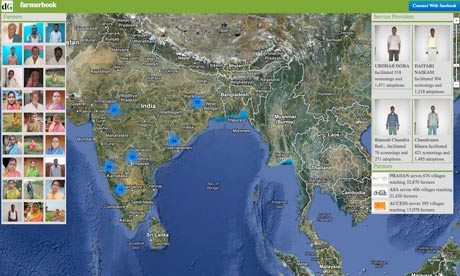
Social media and mobile technologies offer a wide range of benefits for people working in development: a potentially cheap and efficient way to link citizens with their governments, the chance to monitor real-time progress on projects, and the ability to connect people from remote parts of the world to share experiences and teach best practice.
It is no surprise that there's an endless stream of development projects trying to tap into these technologies. In many cases it's still too early to tell what difference these efforts will make, but here are five that caught our eye.
World Bank Finances app
The World Bank spends billions of dollars on aid projects around the world, but where does this money go, and who wins bank-funded contracts? A new mobile app from the bank's finances team lets users find and monitor bank-funded projects near to where they live, using mapping and GPS technology. The app, which came out of a Development Data Challenge (DDC) project last year, is available on Android, iTunes and the web, and connects directly to social media networks. Sam Lee, from the bank's finances team, says this will allow users to share what they find, feedback on data accuracy issues or report allegations of fraud and corruption. The DDC was a series of "hackdays" focusing on development data, co-sponsored by the Guardian Global development site.
#Ministermondays
Every other Monday, Rwanda's health minister, Dr Agnes Binagwaho (@agnesbinagwaho) takes to Twitter for her #Ministermondays Twitter chats. The minister says on her blog: "It is so important for Rwandans to be able to communicate with their government. In the Ministry of Health and throughout the central government, we strive for transparency, accountability, and accessibility." Demonstrated in this Twitter exchange, the minister and her team respond directly to questions that come in.
@mufreddo If we keep this we will always run after the number. We really need to increase our capacity to educate. #MinisterMondays #Rwanda
— Agnes Binagwaho (@agnesbinagwaho) December 17, 2012
But although Twitter is popular in Rwanda, penetration is still low, so Nyaruka Listen has been set up to enable people to engage via SMS, and it's been reported that health workers in each village are encouraged to make mobile phones available for people to contact the minister, with the minister promising to explore every claim.
Digital Green
How can farmers, working in remote locations, feel connected and request help from others if they need it? Digital Green is a grassroots campaign, supported by international donors and the government of India, that leverages social media to share agricultural best practices. The site hosts thousands of videos by farmers, for farmers, covering topics from seed treatment to income generation. The scheme works with over 125,000 farmers, 70% of whom are women. To strengthen collaboration, Farmerbook, a social network for farmers to promote themselves, responds directly to questions and tracks how many people have adopted their suggested methods, and in a bid to engage a wider online audience, Wonder Village, a Farmville-like game, is available on Facebook.
Catapult
Catapult is the first crowdfunding platform for projects aimed at women and girls. Catapult connects supporters to projects through social sharing, encouraging users to donate and track the progress of their donations. Projects cover a wide range of issues, such as a national push for birth waiting homes for mothers in Sierra Leone, to global initiatives such as one that brings together girls from the African Union and the G20. Though each project must display an overview of project costs, it would be interesting to learn whether more detailed information, on administration costs for example, would encourage some donors to donate more.
I Paid a Bribe
I Paid a Bribe is an anticorruption movement that harnesses the power of collective voices. Protected by anonymity, users are encouraged to report on corrupt acts, through a website, email or SMS. The reports are mapped on the site and used to inform campaigns for better governance. The movement is active in India, Greece, Kenya, Pakistan and Zimbabwe, after its founder, Tawanda Kembo, was pressured to pay a bribe by a corrupt police officer, and will be coming soon to the Philippines and Mongolia.

